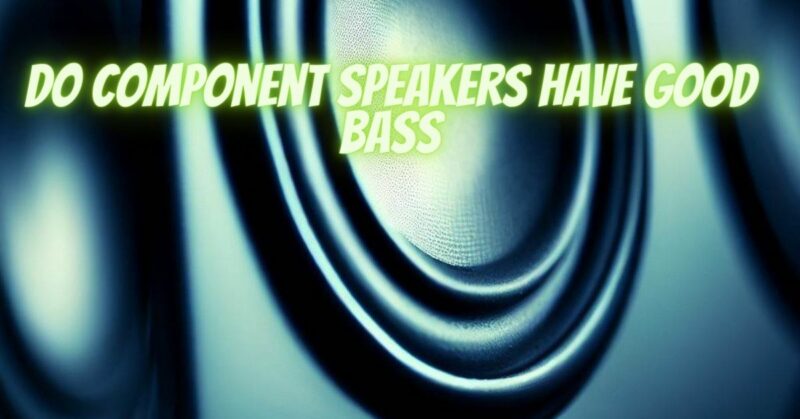Component speakers are known for their ability to deliver high-quality sound reproduction across different frequency ranges. While they excel in producing accurate and detailed mid-range and high-frequency sounds, the bass performance of component speakers can vary depending on several factors. In this article, we’ll explore the bass capabilities of component speakers and discuss the factors that can influence their bass performance.
Component speakers typically consist of separate drivers, including a woofer for low frequencies, a tweeter for high frequencies, and sometimes a mid-range driver for the mid-range frequencies. The woofer is responsible for producing the bass sounds in a speaker system. The size, design, and construction of the woofer play a crucial role in determining the bass performance of component speakers.
The bass response of component speakers can be influenced by the following factors:
- Woofer Size: The size of the woofer directly affects its ability to reproduce low frequencies. Generally, larger woofers have a greater surface area and are capable of moving more air, resulting in deeper and more impactful bass. However, the overall design and quality of the woofer are equally important in achieving good bass performance.
- Woofer Design: The design of the woofer, including the cone material, surround material, and voice coil, can significantly impact the bass response. High-quality materials and construction techniques can enhance the woofer’s ability to accurately reproduce low frequencies and minimize distortion.
- Enclosure Type: The type of enclosure used with component speakers can also affect the bass performance. Different enclosure designs, such as sealed enclosures or ported enclosures, have different characteristics when it comes to bass reproduction. The enclosure should be properly matched to the woofer to achieve optimal bass response.
- Amplification and Equalization: The power and quality of the amplifier driving the component speakers, as well as the equalization settings, can greatly impact the bass performance. Providing adequate power and ensuring proper equalization can help optimize the bass output and overall sound quality.
It’s important to note that component speakers, while capable of delivering good bass performance, may not provide the same level of bass output as dedicated subwoofers. Subwoofers are specifically designed to reproduce deep and powerful bass frequencies, and they excel in delivering the low-end impact that many music enthusiasts and audiophiles desire.
If you’re looking for deep, thunderous bass, incorporating a dedicated subwoofer into your audio system is recommended. A subwoofer complements the component speakers by focusing on reproducing low frequencies, allowing the component speakers to focus on the mid-range and high-frequency sounds.
In summary, component speakers can produce good bass performance when properly designed, matched with the right enclosure, and driven by a quality amplifier. However, for those seeking enhanced low-end performance and impact, a dedicated subwoofer is often the preferred choice. By carefully selecting and integrating component speakers, subwoofers, and other components in your audio system, you can achieve a well-balanced and immersive listening experience that satisfies your personal preferences.


